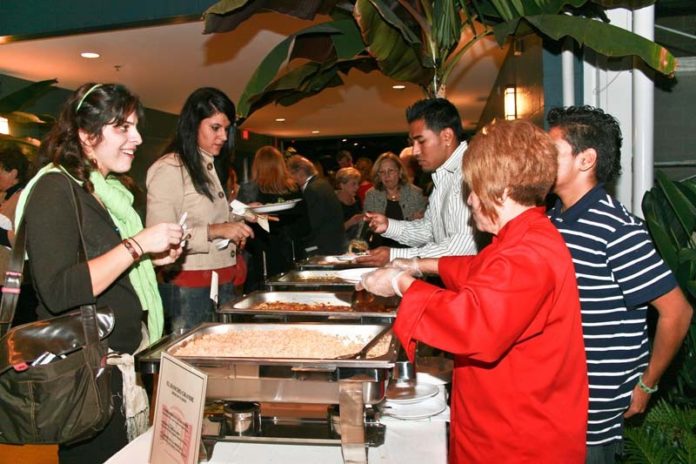
Federal Hill House, the 125-year-old Providence social-services nonprofit, has run its annual fundraiser, Taste of the Hill, offering nibbles and wine and beer sampling from popular Providence restaurants, for 11 years.
The first five or six years, according to Nina Padne, the group’s executive director, were a total success. The last half dozen?
“We have seen significant changes in how much money we’re able to raise,” said Padne, pointing out that the event used to raise close to $50,000 and last year netted Federal Hill House just $12,000.
Volunteers sent back to the workforce now with less time on their hands, corporate entities with less control over discretionary funds, and individual donors at all levels with restricted budgets have all affected nonprofit fundraising during the economic downturn.
Traditional means of fundraising – some proven reliable through many, many years – may no longer be enough, local organizations are finding, to bring in those critical donor dollars.
The question then becomes, they say, do you find additional events to augment what’s been lost or look for other money-raising avenues.
Acknowledging the organization has a national reputation that draws supporters no matter what, Tracy Garabedien, director of event management at Special Olympics Rhode Island, said even they have had to make changes. An annual black-tie event has been made “cocktail casual” and this past year they raised the ticket price on their annual fashion show by $5. They lost, she said, about 5 percent of attendees.
“I know the challenges that we face even being who we are,” she said. “I can’t imagine what [the smaller groups] are going through.”
But that doesn’t mean they’re looking for brand-new events and other organizations hold a similar outlook.
Eileen Hernandez, executive director of the Children’s Shelter of Blackstone Valley, said her organization switched from an annual golf tournament to a fashion show because of board-member interest – not from research into how to stand out from the crowd.
It’s worked out, with the new event drawing approximately 300, where the golf outing got about 80 people.
“Everyone in the nonprofit world has to look really hard for funds and we just love doing it,” she said. “When you do something you enjoy, it helps you to be more successful. So many things have been tried.
“It’s pretty hard to come up with new and creative ideas,” said Hernandez.
She’s not kidding.
Golf tournaments, wine tastings, cocktail parties, fashion shows and comedy dinner shows have all long been staples of the nonprofit-fundraising world.
Most are done because they work in getting people – and their donation dollars – out of the house for the cause by generating a mixed atmosphere of social goodwill and social interaction.
Some work better than others, of course, depending on an organization’s audience.
Carol Palner, co-president of the Friends of the Scituate Animal Shelter, hasn’t had to spend all that much time organizing the group’s upcoming beer and wine tasting on May 8 at Tavern on Main, in Glocester, which is donating use of space inside the restaurant.
The wine and beer also are being donated, limiting FSAS’s overhead costs.
This is the second wine tasting they’ve done.
“[The first] didn’t cost us a penny,” said Palner. “I saw lots of other groups doing it and it just seemed like something that most everyone likes. We’re hoping it does better.”
A 2010 wine event brought in $725, in comparison to upward of $2,700 the group’s annual crafts festival, held each fall, has previously generated.
“I think tradition works for us out here because people like that sense of consistency,” said Palner.
Others agreed, saying they have no plans to stop running events for which their supporters have come to look forward.
Taste of the Hill, which garners much local support in terms of food and beverage donations, is still profitable, she said, adding that it’s the corporate sponsorships that really have fallen off.
Garabedien celebrated the near-level fashion show attendance and said the organization isn’t looking to introduce any new events.
Palner said her group relies entirely on events, including, in addition to the wine tasting and crafts festival, dog washes and yard sales, and hasn’t considered applying for grants or any other fund-generating avenues.
Federal Hill House retained a consultant at the end of last year and is working on “refueling” its funding strategies, Padne said.
The group is examining its social media strategy and other outreach methods.
They may be on the right track.
Doris Feinberg, president of The Prospero Group, a Newport consultancy firm that advises nonprofit boards of directors, executives and fundraising staff, said maintaining an annual event as a means of visibility is essential but shouldn’t be what nonprofits rely on for fundraising.
Donors, she said, are being pickier in this economy.
“Donors are more savvy,” she said. “They’re looking for the best return on their investment and the best impact, with a mission-driven purpose. That comes from deepening the relationship on a very personal level and that doesn’t happen through events.” •












